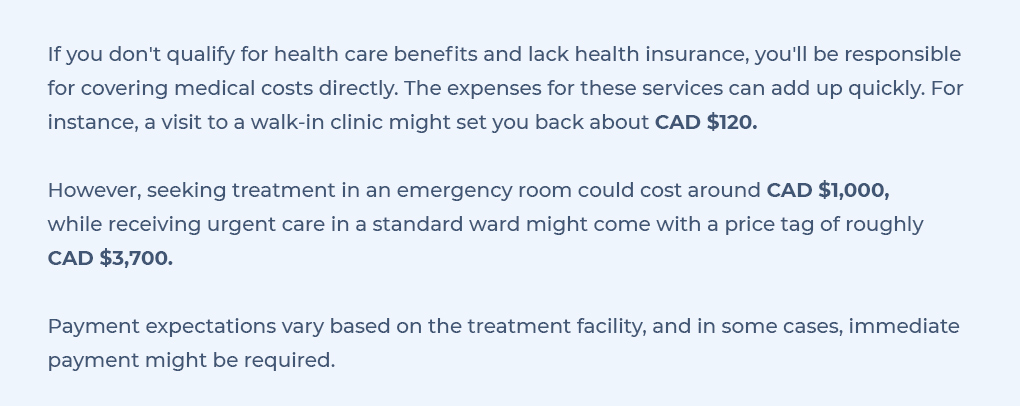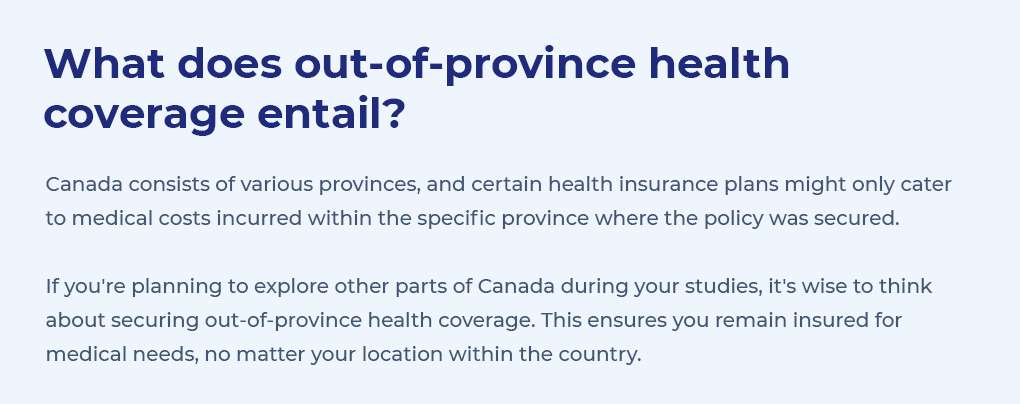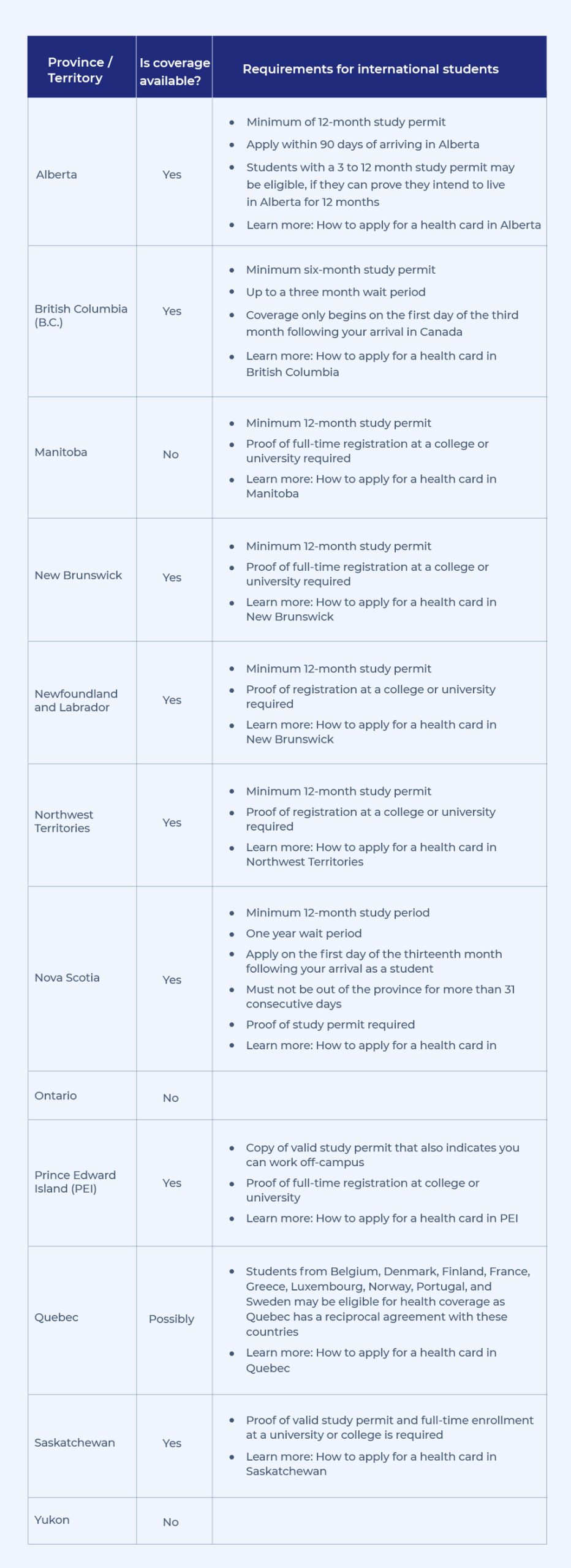

Canada, renowned for its breathtaking landscapes, rich history, and a tapestry of cultures, has solidified its reputation as a global leader in healthcare and well-being. Its healthcare system, predominantly public and universally accessible to its residents, embodies the nation's commitment to holistic care. For international students choosing Canada for their educational pursuits, understanding the intricacies of this healthcare framework is paramount. This blog explores the medical and healthcare amenities that international students in Canada can expect during their educational journey.
In this blog we will cover the following 18 topics:
In Canada, the bulk of health care costs are covered by taxpayer funds, making many health services either free or available at a minimal cost. The responsibility for health care administration lies with individual provinces, resulting in 13 separate provincial and territorial health insurance schemes. Possession of a health insurance card from a province ensures you are exempt from paying for a majority of health services.
Residents of each province or territory receive their specific health insurance cards. The time it takes to obtain this card can differ based on your location. For instance, while British Columbia mandates a waiting period of up to three months for eligibility to its Medical Services Plan (MSP), Alberta residents face no such delay when applying for their health insurance card.
All provinces and territories shoulder the expenses for essential health services for individuals enrolled in their respective health care programs. This encompasses consultations with physicians, necessary medical tests like blood tests or x-rays, and stays in standard hospital wards.
However, the extent of additional services covered by the universal health care system can differ across provinces. To illustrate, while Manitoba provides coverage for seven chiropractic sessions annually, Nova Scotia ensures free basic dental treatments for children up to 14 years old.

In Canada, the health insurance provisions for international students are largely governed by the provinces and territories. Most Canadian provinces offer provincial health coverage to international students, but the requirements and duration of the coverage can vary.
In some provinces, international students are eligible for provincial health care after a waiting period, while in others, they must purchase private health insurance until they become eligible for provincial coverage. The costs and coverage details for these insurance plans differ based on the province and the institution.
Those on a study permit in Canada should ensure they have adequate health insurance coverage. The annual premium for health insurance for international students in Canada can fluctuate based on the province, institution, and specific coverage chosen.
The insurance often addresses primary health care needs, but students should assess each plan thoroughly to ensure it caters to their requirements. Insurance plans might be renewable each year, depending on the province or private insurer's terms.
Additionally, in certain provinces or for specific visa categories, there might be a minimum coverage requirement, emphasizing the importance of understanding the intricacies of health insurance in the Canadian context.

Before we delve deeper, it's crucial to understand who can tap into the health services tailored for international students in Canada:
Type of Institution: For international students to access health services or qualify for institutional health insurance offerings in Canada, they usually need to be enrolled in recognized institutions. This encompasses leading universities and colleges which often have provisions for their health clinics or insurance schemes
Provincial and Territorial Health Insurance Plans (PTHP): A significant number of Canadian provinces and territories offer health insurance plans that are tailored for their resident populations, including international students. These plans are formulated considering that students may not possess the monetary means to avail standard insurance policies. Although the specifics of each province or territory's PTHP might vary, the overarching aim remains: to deliver expansive coverage without exorbitant charges.
In Canada, health care is largely a provincial and territorial responsibility. Many provinces/territories necessitate international students to possess health insurance. Some students might be automatically enrolled in the provincial or territorial health care once they arrive, while others might need to apply.
Considering the structure of the Canadian health care system, having some form of health insurance is imperative. While Canada is known for its public health care system, certain services might not be covered, especially for non-residents.
Therefore, for international students, possessing adequate health coverage becomes vital to evade unforeseen medical expenditures.
International students studying in Canada have multiple health insurance options at their disposal, detailed below:
Provincial or Territorial Health Coverage: Some provinces in Canada, such as British Columbia, Alberta, and Ontario, offer health care coverage to international students under their respective provincial health care plans.
This coverage typically includes necessary hospital and medical services. Once registered, students receive a health card which they must present each time they access health care services.
University-Sponsored Health Plans: Many Canadian universities offer University Health Insurance Plans (UHIP) specifically tailored for international students.
These plans are designed to cover health care services that might not be included in the provincial or territorial health care coverage. It is typically included in the tuition fees and provides coverage for various medical needs, including vision and dental care, mental health services, and preventive care.

Certain provinces in Canada offer international students access to their provincial health insurance plans. Conversely, in some provinces and territories, students must sign up for private health coverage.
Below is a summary of individual provinces and their criteria for students to be eligible for universal health care:

Private Health Insurance: If students aren't covered by provincial or UHIP programs, they should explore private insurance policies. Numerous insurance companies in Canada cater to the needs of international students, offering plans that range in coverage and price.
It's vital to assess the features of these plans, such as the inclusion of prescription medications, dental care, or vision care, before making a selection.
Premium: This is the amount payable to avail of the insurance coverage.
Deductible: This refers to the amount the insured party pays before the insurance starts covering the expenses.
Co-Pay: This is a fixed amount the insured individual pays for a covered healthcare service after paying any deductibles.
Expenses: These are the fees linked to various health services – from hospital admissions, surgeries, prescription drugs, to diagnostic tests. Each insurance policy defines these expenses.

International students embarking on their educational journey in Canada have numerous health insurance alternatives. Here's an outline of the health insurance options available to international students in Canada:
Provincial and Territorial Health Insurance:
Depending on the province or territory, international students might qualify for public health insurance.
For instance, in British Columbia, Alberta, and Saskatchewan, international students can avail themselves of provincial health coverage. The coverage usually includes essential medical services, but the eligibility and duration can vary.
International Student Health Insurance Plans: Many Canadian universities collaborate with insurance providers to offer tailored health insurance packages for international students.
This coverage often complements the provincial or territorial health insurance, covering aspects like dental care, prescription drugs, and vision care.
Private Health Insurance: Some students, depending on their location or duration of study, might not qualify for provincial or territorial health insurance.
In such cases, they can opt for private health insurance plans. Companies like Blue Cross, Sun Life, and Manulife provide health insurance plans specifically designed for international students in Canada.
Study Permit Holder Insurance: Students with a valid Canadian study permit can access this insurance, providing coverage similar to provincial plans, but from private providers. It often covers hospitalization, doctor visits, and sometimes additional services like vision or dental care.
Post-Graduation Work Permit (PGWP) Insurance: After completing their studies, international students with a PGWP can avail themselves of this insurance. As they transition from student status, their insurance needs might change. This plan accommodates their health needs during their employment phase in Canada.
Emergency Medical Insurance: Aimed primarily at short-term international students or those waiting for their provincial or territorial health coverage to activate, this insurance type covers emergency medical situations, from accidents to sudden illnesses.
Given the diverse range of health insurance options, international students in Canada must assess their individual needs, the duration of their stay, and the province's specific requirements before selecting the most suitable plan.
Upon securing eligibility and enrolling in a student health plan in Canada:
Basic Health Services: The majority of student health plans cover fundamental medical needs, such as routine check-ups, consultations with general practitioners, essential medical procedures, and non-elective surgeries.
Prescription Medications: Many plans include coverage for prescription drugs. However, like in the U.S., students might still have certain out-of-pocket expenses like co-payments, deductibles, or might need to cover a portion of the medication cost.
Dental and Vision Services: It's common for student health plans in Canada to not automatically cover dental and vision services. When they do, it's often basic – covering routine dental check-ups or standard eye exams. If comprehensive dental or vision coverage is a priority, students may consider purchasing standalone dental or vision plans.
Even with a Canadian student health insurance plan, not every service is guaranteed coverage. Students may find themselves bearing some costs, and there might be specific services or treatments that the insurance does not cover.
Examples include elective or cosmetic surgeries, certain dental and vision treatments, holistic or alternative treatments, and travel-related vaccinations. It's essential for students to meticulously examine the specifics and any exclusions in their chosen insurance plan to ensure they are well-prepared for any medical needs or emergencies.

Canada’s health insurance system, predominantly public, works through its provincial and territorial systems. Each province or territory has its medical insurance plan, with the government directly settling bills with healthcare providers. Canadians receive a health card from their provincial or territorial government, allowing them to access a range of basic medical services.
Coverage Framework Under the Canada Health Act, provinces and territories offer coverage for essential hospital and medical services, mostly without direct charges at the point of care. Services like yearly check-ups, emergency treatments, surgeries, and hospital stays that are not elective are generally included. Additional services, such as dental care, vision tests, and prescription drugs, might have separate coverages or plans.
Deductibles and Premiums: While the majority of basic healthcare services in Canada are funded through taxes and thus free at the point of use, some provinces may charge premiums or have deductibles for supplementary health services. It's vital for international students to be familiar with any such additional costs in their specific province or territory.
Reimbursement Models: Some provinces or private insurance providers in Canada may use a reimbursement model for specific non-core services. This means students may have to pay upfront and later claim a refund. Always understanding your coverage's claims process can help navigate these potential costs.
Claim Submissions: Similar to the US, Canadian insurers (especially private ones) might require a claim submission with necessary documentation. While the public system often bills directly, having proper documentation is crucial for any services outside the public coverage.
In Canada, health coverage for international students varies by province. Some provinces cover international students under their public health plans, while others require students to purchase private health insurance:
Province/Territory of Study: The province or territory where a student studies influences the type of coverage they'll get. Some regions provide public health insurance to international students after a waiting period, while others don't.
Duration of Stay: The length of a student's program and their visa status can impact insurance eligibility and costs. Longer programs might offer better opportunities for joining public health plans.
Extent of Coverage: Private insurance plans vary in terms of what they cover. While some might provide comprehensive coverage, including vision and dental, others might offer only basic coverage. It’s important for students to evaluate plans closely and determine what fits best with their needs.
In Canada, the healthcare system is largely public, but the provisions for international students vary from one province or territory to another. The cost for health insurance for international students can differ based on the region and the type of coverage chosen. On average, health insurance for international students in Canada can range from CAD $600 to CAD $900 annually.
Most provinces and territories in Canada have certain health insurance provisions for their international students.
For instance, provinces like British Columbia, Manitoba, and Newfoundland and Labrador provide international students with access to their provincial health care, albeit with certain conditions and waiting periods.
On the other hand, provinces like Ontario and Quebec often require international students to purchase private health insurance unless they're covered under a specific agreement between their home country and the province.
The motive behind this requirement is to ensure that international students can access quality healthcare without financial strain during their stay in Canada
Given that healthcare is a shared responsibility between federal and provincial/territorial governments in Canada, the rules, coverage, and costs can differ notably.
Therefore, it's crucial for international students to understand the insurance prerequisites of their chosen province or territory and ensure they're adequately covered during their academic tenure.
University Health Centres Most Canadian universities operate health centres on campus. These centres cater to the primary healthcare needs of students, including routine check-ups, minor ailment treatments, and preventive care. International students often find these centres as the most accessible healthcare providers. For advanced or specialized care, referrals to external healthcare establishments might be necessary.
While Canada is known for its public healthcare system, there are private healthcare providers and specialists available. Should a student need specialized treatment or a second opinion, referrals from primary healthcare providers or university health centres might direct them to these specialists. It's vital to ascertain if your insurance covers visits to private specialists to avoid unforeseen expenses.
For emergencies, Canada has a robust network of hospitals with emergency departments primed to address critical health concerns. Although public healthcare often covers emergency treatments, it's crucial to understand the extent of your coverage, especially as an international student.
Pharmacies, both chain and local, are prevalent across Canada. Prescribed medications can be availed from these establishments. It's noteworthy that while doctor visits might be covered, the cost of medications isn't always fully covered under provincial plans, making prescription coverage in private insurance essential.
Recognizing the challenges of academic life, Canadian universities often provide mental health resources, including counselling services. Some of these services may be offered at subsidized rates or free of charge for students. The wider community also offers various helplines and support groups catering to mental health.
Like in the U.S., dental and vision care in Canada typically fall outside the purview of standard provincial health coverage. International students should contemplate purchasing supplementary insurance for dental and vision services, as these can become substantial expenses without coverage.
While Canada is praised for its public healthcare, it's essential for international students to understand what's covered and what isn't. Clarity about coverage specifics, possible out-of-pocket costs, and other potential expenses will ensure students are well-prepared.
Regularly consulting the health services department of one's university is beneficial for international students. This way, they can stay updated on any changes in healthcare policies, avail services efficiently, and be alert to health advisories, especially in light of any pressing global health issues.

1. Understand Your Health Coverage: Before you leave your home country, familiarize yourself with the health insurance provisions in Canada. Each province has its own health insurance plan, so it's essential to understand what's covered in your province of study. Some universities also offer health plans tailored for international students.
o Tip: Plan weekly meals, incorporating various food groups. This not only ensures you're getting essential nutrients but can also save money.
2. Utilize Campus Health Centres: Most Canadian universities have health centres that provide primary healthcare services. These centres are ideal for regular check-ups, vaccinations, and consultations about minor health concerns.
Tip: Beyond gym workouts, consider walking or cycling around campus or the city to both exercise and explore.
3. Dress for the Weather: Canadian weather can be a mix of extremes. Ensure you're dressed appropriately, especially during the cold winters. Investing in a good quality winter jacket, boots, gloves, and a hat is essential.
4. Eat a Balanced Diet: Canada offers a diverse range of foods. Incorporate plenty of fruits, vegetables, lean proteins, and whole grains into your diet. Also, understand where to shop for specific dietary needs or familiar foods from home.
5. Stay Active: Make use of campus gym facilities or join local sports leagues. Walking or cycling can also be excellent ways to explore your city while staying fit.
6. Prioritize Mental Health: Studying abroad can sometimes be overwhelming. Make use of counselling and mental health services offered by universities. Remember, it's okay to seek help when needed.
7. Avoid Harmful Habits: While it might be tempting to indulge in parties and late-night gatherings, moderation is key. Avoid excessive alcohol consumption and steer clear of smoking.
8. Regular Sleep is Essential: With the excitement of a new environment and academic pressures, don't compromise on sleep. Aim for 7-9 hours of restful sleep each night.
9. Be Informed About Local Health Resources: Apart from university health centers, familiarize yourself with local clinics, pharmacies, and hospitals. Knowing where to go in case of an emergency can be life-saving.
10. Connect and Socialize: : Staying socially active can greatly benefit your mental health. Join student clubs, attend meet-ups, or volunteer. Building a support system will make your time in Canada enriching and memorable.
Staying healthy in Canada goes beyond physical well-being. By balancing academics with self-care, nutritious eating, regular exercise, and social interactions, international students can make the most of their Canadian experience. Remember, your health is an investment in your future success!

Studying abroad is an exciting and life-changing experience that offers students a chance to gain a global perspective and valuable exposure ...

In our rapidly globalizing world, where boundaries are melting away and opportunities abound, proficiency in the English language has become ...

Choosing to pursue higher education abroad is an exciting and life-changing decision. Among the plethora of options available to internationa...

Studying abroad is a life-altering adventure that opens doors to new cultures, experiences, and opportunities. Among the plethora of global s...

Australia, renowned for its world-class education and diverse cultural experiences, continues to be a favoured destination for international ...

Australia is not just famous for its iconic Sydney Opera House, the Great Barrier Reef, and its unique wildlife; it is also recognized global...

Studying abroad is a life-changing decision, and with so many options available, it can be overwhelming to choose the right country and univers...

As of March 2022, Australia has seen a consistent rise in its international student numbers, with enrolments reaching 440,219. This marks an ...